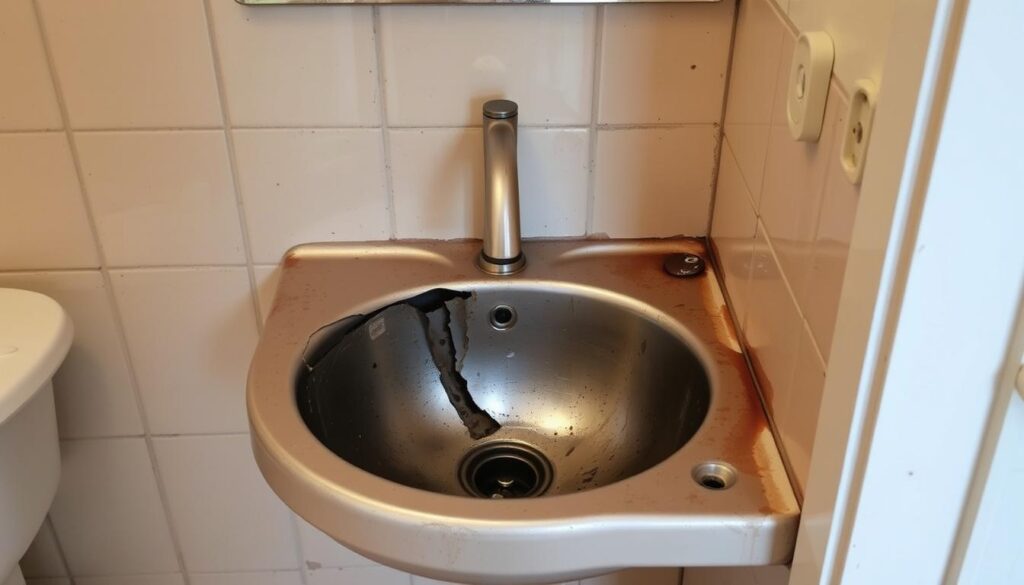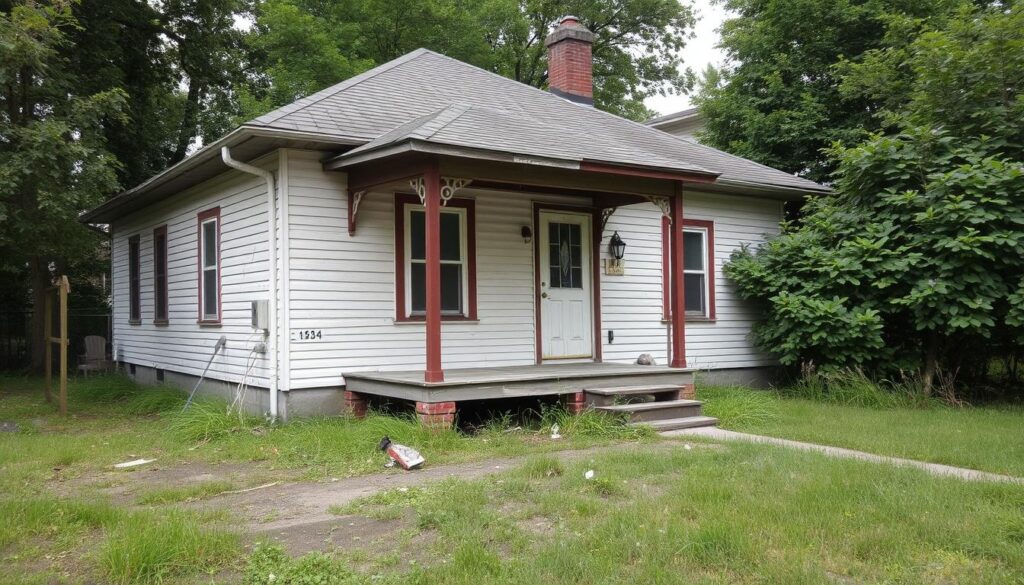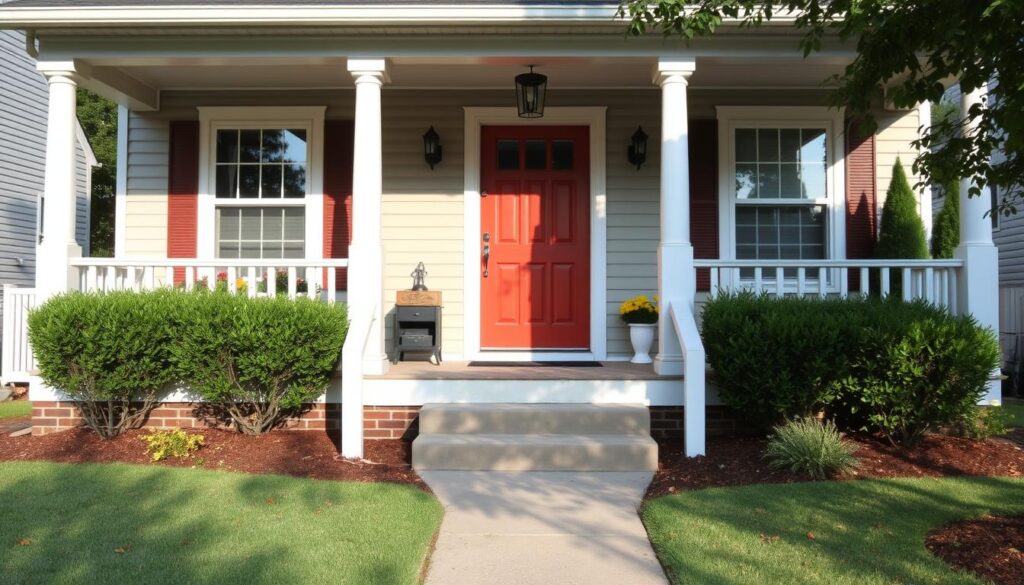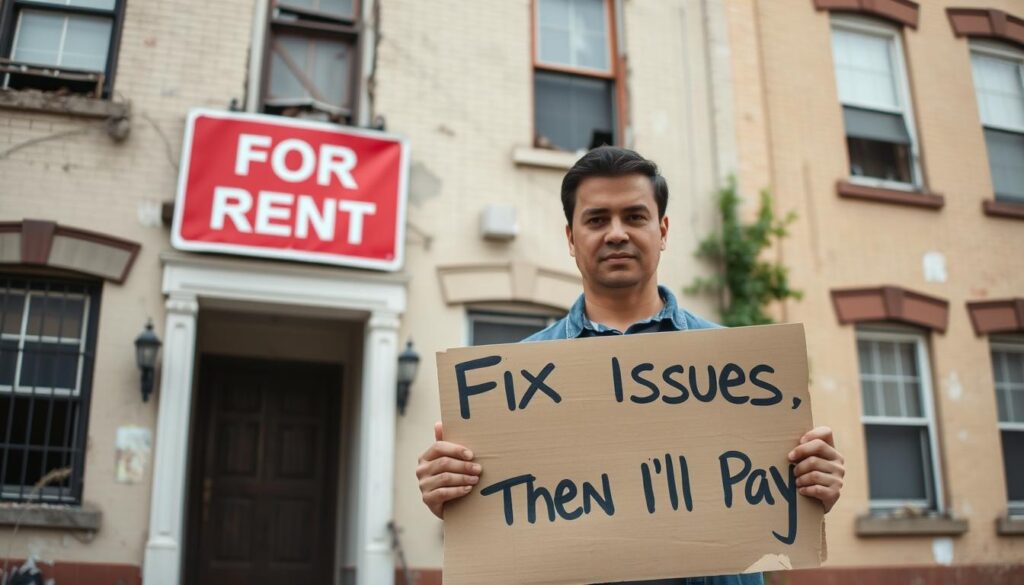Renting a home in New Jersey means both tenants and landlords have rights and duties. The state’s laws make sure all renters live in safe and decent homes. If landlords don’t keep up with repairs, tenants might ask if they can hold back rent. Yes, they can in New Jersey under specific conditions.
In New Jersey, living in a safe home is a must. Buildings with more than three rental units must meet certain upkeep standards. For one and two-unit buildings not lived in by the owner, there are different rules1. These rules protect tenant rights and make sure landlords keep up with maintenance duties.
If a rental is not safe or comfortable, tenants might think about not paying rent. Courts say it’s okay to do this for big problems like no heat, no hot water, or broken AC in summer2. But, small issues like cracked walls or not painted walls don’t usually mean you can hold back rent2.
Before not paying rent, tenants must tell their landlords about the problem and give them a chance to fix it2. It’s important to know that landlords can still take you to court for unpaid rent. To be safe, tenants should put the withheld rent in a separate account2.
Key Takeaways
- New Jersey law allows rent withholding for serious habitability issues
- Tenants must notify landlords before withholding rent
- Different rules apply to buildings based on the number of units
- Courts have defined what issues justify rent withholding
- Tenants should deposit withheld rent in a separate account
- Landlords can still sue for unpaid rent, even if withheld due to repairs
- Minor issues don’t typically warrant rent withholding
Understanding Tenant Rights in New Jersey
New Jersey law protects tenant rights, making sure homes are safe and fit to live in. The state has a rule that landlords must keep rental units in good condition. This rule is called the implied warranty of habitability.
The Implied Warranty of Habitability
This idea means landlords must keep rental units safe and suitable for living. They must ensure apartments stay warm enough, with temperatures around 68 degrees from 6 a.m. to 11 p.m. And at least 65 degrees from 11 p.m. to 6 a.m3.
Legal Protections for Tenants
New Jersey has laws to protect tenants. These laws say landlords can only ask for a security deposit equal to 1.5 times the monthly rent. They must also give tenants a receipt for any deposit taken4. Plus, landlords must give 30 days’ notice before raising the rent4.
The state also deals with lead paint issues in apartments. Kids under six need to get tested for lead poisoning, and there’s free testing for Medicaid kids3. Owners of apartment buildings must follow rules about lead paint, and health departments check for lead paint problems3.
Importance of Habitable Housing
New Jersey laws say rental properties must be strong and safe from defects that could harm people4. This shows the state’s strong support for tenant rights and safety. If tenants face problems with their homes, they can take steps like not paying rent, fixing and deducting costs, or asking for reduced rent.
Knowing these rights helps tenants fight for safe, decent homes. They can also seek legal help when needed.
What Constitutes a Habitable Living Space?
In New Jersey, a living space must meet certain standards to keep tenants safe and comfortable. These standards include having working plumbing, hot water, heating, and security measures. They follow local health, building, and safety codes5.
Vital facilities are key to a safe home. They include working toilets, enough heat and electricity, and safe windows. The state sets minimum standards for temperature, utilities, and structure to keep living areas safe.
Landlords must put in smoke detectors in single-family homes or duplexes at lease start unless agreed otherwise5. They also need to keep the property safe from hazards and follow building codes for structural safety6.
Not every issue makes a place uninhabitable. Each situation is looked at closely. Small cosmetic issues might not be a big deal unless they’re a health risk6.
“A habitable living space is more than just four walls and a roof. It’s about ensuring tenants have a safe, healthy, and comfortable environment to call home.”
If a landlord doesn’t provide a safe place, tenants in New Jersey have rights. They can stop paying rent after a seven days’ notice if the landlord doesn’t fix the problem5. But, tenants must also follow building, housing, and health codes to keep their place safe and clean5.
The Process of Reporting Housing Code Violations
Reporting housing code violations is key to keeping living spaces safe and decent. The steps to take depend on the building type and the issue at hand.
Contacting the Bureau of Housing Inspection
Buildings with three or more rental units must follow specific rules. They need to register with the Bureau of Housing Inspection. Tenants can report code violations directly to the Bureau.
Local Health Agency Involvement
Local health agencies are crucial in addressing issues like no heat or hot water. They check rental properties to make sure they meet health and safety standards. In Florida, landlords must give tenants running water, hot water, and heat in the winter7.
Dealing with One and Two-Unit Buildings
For one and two-unit buildings, local laws apply. Tenants should reach out to their local housing department or health agency for violations. Remember, landlords need to register to file evictions.
| Building Type | Reporting Authority | Key Requirements |
|---|---|---|
| 3+ Units | Bureau of Housing Inspection | Registration, compliance with hotel/multiple dwelling regulations |
| 1-2 Units | Local Housing Department | Compliance with municipal ordinances |
| All Units | Local Health Agency | Issues like heat, water, pest control |
In Florida, landlords must stick to local housing, building, and health codes. They need to keep the property in good shape8. This includes controlling pests, keeping locks and keys in order, and ensuring common areas are clean and safe8.
Tenants facing maintenance problems have options. They can write a notice of violations and might not pay rent or end the lease if not fixed in seven days8. But, they should be careful as not paying rent could lead to eviction, even with a seven-day notice7.
Legal Remedies for Tenants Facing Habitability Issues
If landlords don’t keep living spaces safe and decent, tenants have legal ways to respond. In New Jersey, tenants can choose from several actions. These include not paying rent, fixing and deducting costs, or ending the lease agreement9.
Tenants facing problems like mold, pests, leaks, electrical issues, or structural damage can take legal steps9. These issues break the implied warranty of habitability. This means landlords must keep places safe and livable10.
Before taking legal action, tenants should gather all the evidence they can. This means taking photos, recording videos, saving messages with the landlord, and keeping important papers like medical records or receipts for temporary stays9.
Sometimes, tenants can stop paying rent and move out or use up to a month’s rent for repairs if landlords don’t fix problems11. Filing complaints with local building departments or going to rent boards are also options for tenants with habitability issues.
For big problems, tenants might be able to move out and sue for constructive eviction11. Talking to a tenant rights lawyer can help. They can offer advice and support in standing up for tenant rights and getting the right remedies for damages or losses from habitability issues9.
Not Paying Rent Due to Repairs: A Valid Option?
Rent withholding in New Jersey is a complex topic. If your living space is in bad shape, you might think about withholding rent. But, it’s important to know the laws and the risks you could face.
Conditions That Justify Rent Withholding
In New Jersey, landlords must fix big repairs quickly if they make your home uninhabitable12. If you don’t have heat, hot water, or basic services, you might not have to pay rent. Make sure to keep records of these issues before you decide what to do next.
Legal Precedents in New Jersey
Cases like Berzito v. Gambino and Academy Spires, Inc. v. Brown have set rules for rent withholding in New Jersey. These cases tell us when you can stop paying rent for repairs.
Risks and Considerations
Withholding rent comes legal risks. Landlords can start eviction quickly once they get a judgment12. To lower your risks, you should:
- Put withheld rent in a separate account
- Tell your landlord in writing about the repair issues
- Be ready to explain your actions in court if needed13
In some places, you must put withheld rent in a court account or escrow until repairs are done13. It’s key to know the laws where you live before deciding to withhold rent.
“Rent withholding should be a last resort after all other communication attempts have failed. Always consult with a legal professional before taking this step.”
Remember, there are big legal risks with rent withholding. While it’s an option in New Jersey, be careful and well-prepared before you do it.
The Repair and Deduct Method
The repair and deduct method lets tenants fix important problems if landlords don’t act. They can pay for repairs and then subtract the cost from their rent. This is a strong way to keep rental properties in good shape and keep tenants safe.
In places like California, tenants can use this method twice a year, with a limit of one month’s rent14. Iowa also allows tenants to make repairs, but the cost can’t go over a month’s rent15. These rules help protect both tenants and landlords from misuse of the repair and deduct option.

To use this method, tenants must prove the issue makes the place unlivable and wasn’t their fault. California lists eight types of problems that qualify, like plumbing and heating issues14. In Iowa, the problem must make the property unfit for living and not be the tenant’s fault15.
Before fixing things, tenants should tell their landlord in writing and wait for a reasonable response. If the landlord doesn’t fix it within seven days in Iowa, tenants can end their lease15. It’s important to keep records of all talks and repair receipts.
The repair and deduct method can help with tenant repairs and keeping up the rental. But, it comes with risks. If tenants deduct costs wrongly, they could face eviction or be ordered to pay damages14. To avoid problems, tenants should know the local laws well and get legal advice when needed.
| State | Repair and Deduct Limit | Frequency Allowed |
|---|---|---|
| California | One month’s rent | Twice per year |
| Iowa | One month’s rent | Not specified |
Constructive Eviction: When Conditions Force You Out
Constructive eviction means a landlord’s actions or lack of action make a property unfit for living. This legal idea helps renters stay safe and comfortable by allowing them to leave such places.
Definition and Legal Basis
When tenants can’t enjoy their rented space because of serious problems, it’s constructive eviction. They can leave without breaking their lease if the property is too bad16. This rule covers both homes and businesses, affecting both long-term and short-term leases16.
Consequences for Landlords
Ignoring property upkeep can lead to big problems for landlords. They might lose tenants, face legal action, and struggle financially. Tenants could claim damages for moving costs, temporary housing, and health issues from bad living conditions17. Courts might also cut rent if the property is only partly usable17.
Tenant Responsibilities in Constructive Eviction
To claim constructive eviction, tenants must show:
- The property became unfit because of the landlord’s actions or lack of action
- The landlord was told about the issues
- The landlord didn’t fix the problems in a fair amount of time
- The tenant left the property soon after it became uninhabitable17
Renters should keep records of problems with photos or videos and tell their landlord right away16. If facing extreme living conditions, getting legal advice quickly is key, as laws differ by place17.
Rent Abatement: Seeking Reduced Rent for Substandard Conditions
Rent abatement is a powerful tool for tenants dealing with poor living conditions. It lets renters pay less rent if their home doesn’t meet basic standards. This idea comes from the Berzito v. Gambino case, which says tenants only owe full rent if the landlord keeps the place livable.
When tenants face serious issues like mold or broken appliances, they can ask for rent cuts. In San Francisco, many renters have won cases against landlords to get repairs done11. They might get back overpaid rent or have their rent lowered in the future.

Courts decide how much rent should be paid if a place isn’t perfect. This helps figure out if a tenant should pay less rent. In California, tenants can get up to $5,000 if they win a lawsuit about living conditions18. This rule encourages landlords to keep their properties in good shape.
But, asking for rent cuts can be risky. Tenants need proof that the landlord knew about the problems and had time to fix them. Sometimes, starting a rent strike might be an option, but it needs careful planning and evidence18.
| Rent Abatement Method | Description | Potential Outcome |
|---|---|---|
| Court Litigation | Filing a lawsuit for habitability issues | Statutory damages up to $5,000 |
| Rent Board Petition | Requesting a decrease in housing services | Rent reduction to compensate for issues |
| Small Claims Court | Suing landlord for minor habitability problems | Monetary compensation for damages |
Rent abatement is crucial for tenants living in bad conditions. It lets them pay less rent, pushing landlords to keep their properties up to standard. This way, tenants don’t pay full rent for places that aren’t fit to live in.
The Rent Receivership Process in New Jersey
New Jersey’s rent receivership process helps make sure tenants live in safe and clean homes. It’s based on laws like N.J.S.A. 2A:42-85 through 2A:42-96. This lets tenants pay rent to a court-appointed person if their homes are in poor condition19.
It starts when tenants or inspectors file a complaint in court. They list the housing problems, the landlord’s failure to fix them, repair costs, and how much rent is owed19. This starts legal action in the county where the property is found.
After starting, the court might order rent payments to be made to the court clerk. These payments help fix issues like no heat, water, electricity, or sewage19. The court’s administrator makes sure the money is used to fix the property correctly.
Landlords can fight rent receivership by showing the problems don’t exist, are fixed, or were caused by the tenants19. If they succeed, the court might drop the case. If not, the process keeps going until the property is safe and clean.
This legal tool helps tenants deal with big living issues without fear of losing their home. It makes sure both tenants and landlords follow the rules, keeping living spaces healthy in New Jersey.
Landlord Responsibilities for Repairs and Maintenance
Landlords in New Jersey have big duties to keep properties safe and in good shape. They must make sure their rental places are livable and fix things quickly when asked. This is key to meeting their legal duties and sticking to repair deadlines.
Timeline for Addressing Repair Requests
New Jersey law doesn’t set specific times for fixing things, but landlords should move fast. For small problems, a two-week fix-it window is usually okay. But for big emergencies like no heat or water, they must act fast. If landlords don’t fix things quickly, tenants can do it themselves and take the cost out of their rent20.
Emergency Repairs vs. Non-Emergency Issues
Things like gas leaks or flooding need fixing right away. But for small issues like a leaky faucet, there’s more time. Smart landlords focus on keeping up with repairs to prevent big problems later. They also talk with tenants about when repairs will be done.
Consequences of Landlord Negligence
If landlords ignore repairs, they could face big problems. Tenants might not pay rent, ask for lower rent, or move out and claim they were forced out. In some cases, landlords could have to pay for tenants’ temporary housing during big repairs. By keeping up with maintenance, landlords can dodge legal issues and keep their properties in great condition.
FAQ
What rights do tenants have regarding habitable housing in New Jersey?
What is considered a habitable living space in New Jersey?
How can tenants report housing code violations in New Jersey?
What legal remedies do tenants have for habitability issues in New Jersey?
When is it justified for a tenant to withhold rent in New Jersey?
What is the repair and deduct method in New Jersey?
What is constructive eviction, and when does it apply in New Jersey?
How does rent abatement work in New Jersey?
What is the rent receivership process in New Jersey?
What are landlords’ responsibilities for repairs and maintenance in New Jersey?
Source Links
- https://www.nj.gov/dca/divisions/codes/publications/pdf_lti/habitablity.pdf – Microsoft Word – habitablity.doc
- https://caretaker.com/learn/habitability/rent-withholding-laws-in-new-jersey – Rent Withholding Laws in New Jersey | Caretaker
- https://www.lsnjlaw.org/legal-topics/housing/landlord-tenant/repairs-habitability/pages/safe-decent-housing-aspx – No title found
- https://www.steadily.com/blog/things-landlords-cannot-do-in-new-jersey – Things Landlords Cannot Do In New Jersey
- https://www.floridabar.org/public/consumer/tip014/ – Rights and Duties of Tenants and Landlords – The Florida Bar
- https://www.thelopezlawgroup.com/warranty-habitability-florida/ – Implied Warranty of Habitability in Florida | Lopez Law Group
- https://www.tampabay.com/news/real-estate/2023/09/13/landlord-wont-make-repairs-guide-florida-renters-rights/ – Landlord won’t make repairs? A guide to Florida renters’ rights.
- https://bals.org/help/resources/tenants-handbook – Florida Renters Rights Guide
- https://www.liptonlegal.com/habitability-issues/ – Habitability Issues: When to Involve a Tenant Rights Attorney? | Lipton Legal Group, A PC
- https://puschnguyen.com/know-your-rights-exploring-legal-options-to-sue-your-landlord-for-neglecting-repairs/ – Know Your Rights: Exploring Legal Options to Sue Your Landlord for Neglecting Repairs
- https://wolford-wayne.com/is-it-legal-to-withhold-rent-until-repairs-are-done/ – Wolford Wayne LLP
- https://www.justia.com/real-estate/landlord-tenant/information-for-tenants/tenant-faqs/ – Tenants’ Legal Rights & Duties — FAQs
- https://www.azibo.com/blog/legal-reasons-to-withhold-rent – Legal Reasons to Withhold Rent: What Every Tenant Should Know – Azibo
- https://michaelfatelaw.com/articles/when-can-a-tenant-in-california-repair-and-deduct/ – When Can A Tenant in California Repair And Deduct?
- https://www.iowalegalaid.org/resource/how-do-i-get-my-landlord-to-make-repairs – Iowa Legal Aid
- https://www.faegredrinker.com/en/insights/publications/2018/10/constructive-eviction-a-guide-to-landlord-tenant-disputes – Constructive Eviction: A Guide to Landlord-Tenant Disputes | Publications | Insights | Faegre Drinker Biddle & Reath LLP
- https://www.legalzoom.com/articles/renters-rights-understanding-constructive-eviction – Renter’s rights: Understanding constructive eviction
- https://sftu.org/repairs/ – Habitability and Repairs
- https://www.nj.gov/dca/codes/publications/pdf_lti/rent_recvrship.pdf – Microsoft Word – rent_recivership.doc
- https://www.ilga.gov/legislation/ilcs/ilcs3.asp?ActID=2605&ChapterID=62 – 765 ILCS 742/ Residential Tenants’ Right to Repair Act.






